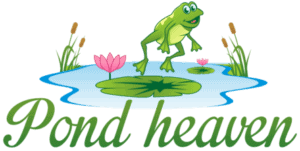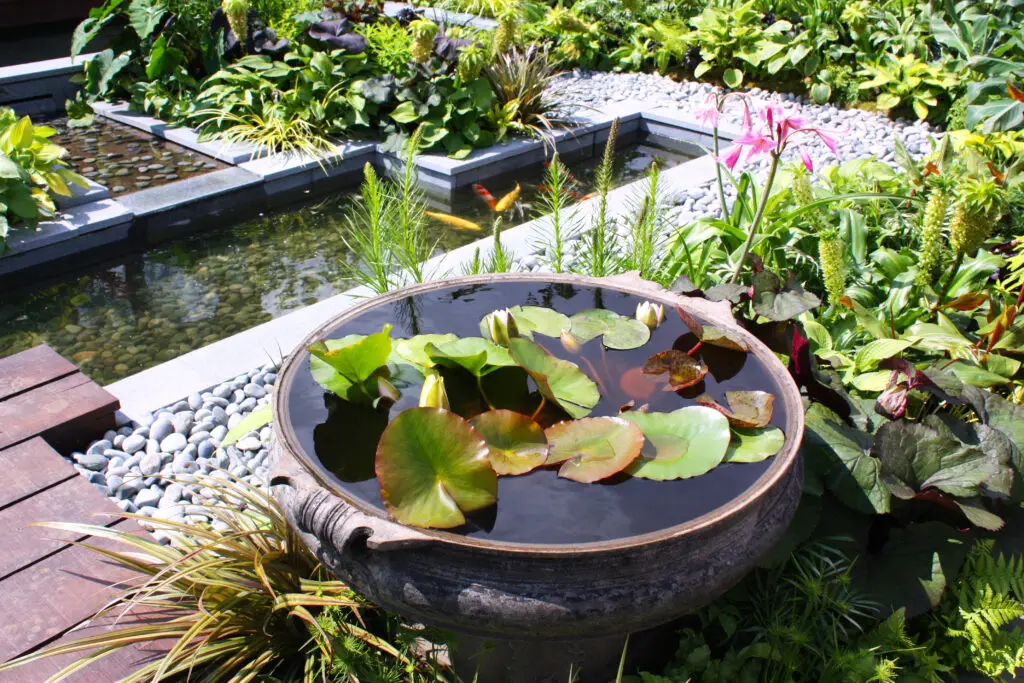
Koi pond water must be replaced frequently to have clean water for the fish. Instead of wasting so much water, you may wonder what you could do with it that could be useful for another part of your garden.
Koi pond water can be used as water for your plants as it acts as an organic fertilizer. The pond water contains high levels of nitrogen and phosphorus, which are both important for plants to grow. Not only does Koi plant water add nutrients to plants, but also a good amount of moisture.
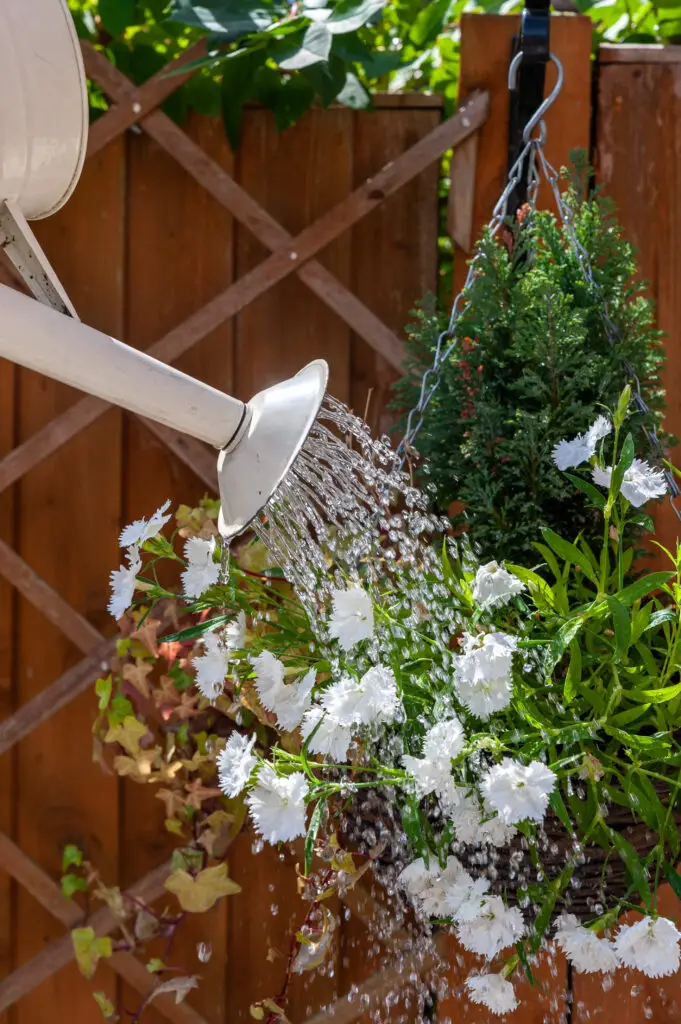
It may be obvious to think about using Koi pond water to water your plants, but there are some factors to consider to ensure it will benefit the plants. The contents of the pond water, such as the nutrient profile and the quantities of each component, say a lot about whether it would be safe for plants.
Pro Tip: If you’re tired of wasting money and making costly mistakes on the koi-keeping hobby or are thinking about buying koi fish but don’t know where to start, I strongly suggest you check out this ebook. I recently read this ebook, and it contains SO much useful information, such as:
- 3 proven steps to identify koi fish diseases
- WARNING: 3 things you should NEVER do when it comes to caring for koi
- When to seek professional help when it comes to looking after your koi
Using Koi Pond Water For Plants
Specific factors in Koi pond water, like other types of pond water, can be used to water plants. Most importantly, the nitrogen content in the water acts as a natural fertilizer for the plants to help them grow.
Using pond water for plants is a great way of reusing this water, but it is also nutritious for your garden. Sometimes the pond water can be too high in certain compounds, which may harm plants.
A good way that some have suggested to prevent this is to clean your Koi pond more regularly (about once a week). Regular cleaning would ensure that the nitrogen or ammonia does not reach very high levels. This strategy also depends on how big the pond and garden are and whether it would be easy to clean so regularly.
If you want to learn more about cleaning and maintaining a koi pond, I have written a blog post called: A complete guide to maintaining a koi pond.
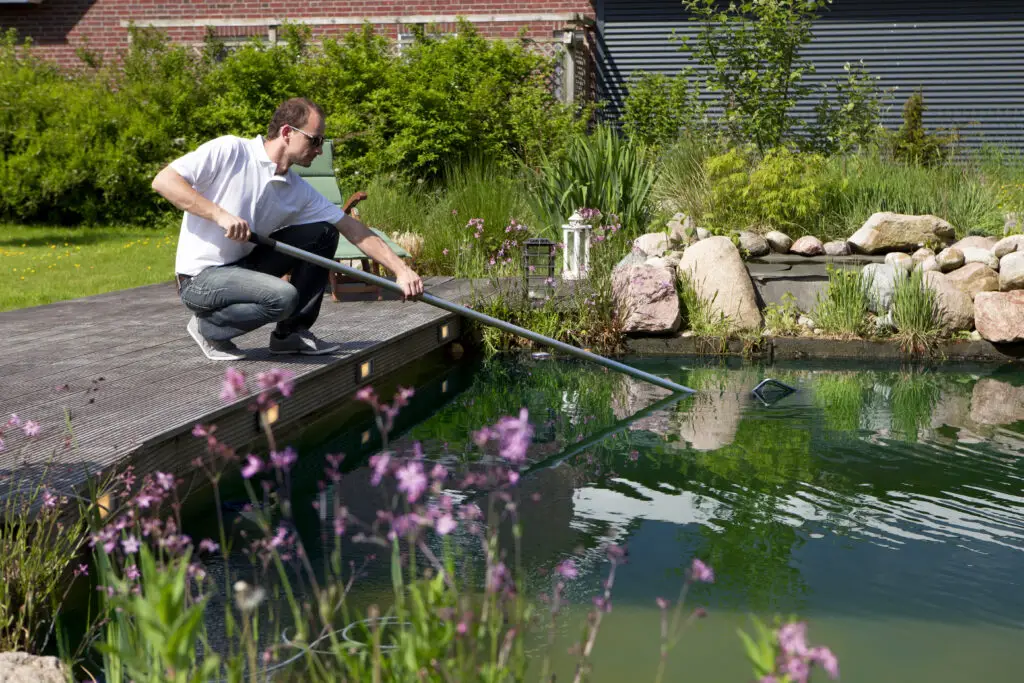
Using pond water to water plants won’t necessarily be the only thing you can use. Depending on the detailed contents of the water, a balanced fertilizer or compost might be required as an extra for your plants.
Usually, the concentration of nutrients in pond water is insufficient to feed the plants. It is generally less than what is found in commercially used plant fertilizers. However, you can combine both to give your plants the best moisture and nutrition without wasting the pond water.
You can do this easily during the regular cleaning of the pond. Place the dirty water into barrels or carts that you can take around in smaller quantities for the rest of the garden to water.
How To Use Koi Pond Water For Plants
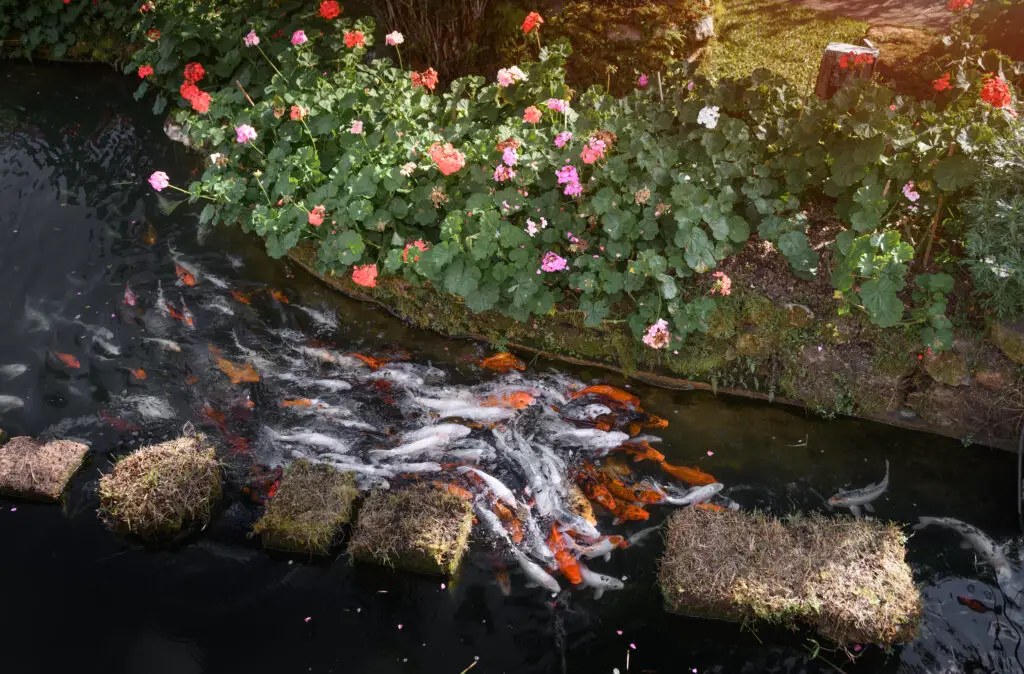
There is a manual and more automatic way to use Koi pond water to water your plants. You can connect your hosepipe to the water filtering system of the pond and fill buckets with this water. This basic system can be a slightly slower process but works well when you don’t want to empty too much water or don’t have that many plants to water.
Another way is to connect the pond water directly to a spraying system if you have a lot of ground that needs watering. You could also fill big barrels and load them onto a truck, making the watering process quicker.
Companies specializing in pond water and irrigation can set up your pond equipment so it can be directed around your garden. When you decide to backwash (remove and change the pond water), you have to turn a lever, and the system will do the rest.
Experts recommend using a bio-filtration system outside the pond, compared to a submersible pump and filter that goes under the water. The submersible equipment does not allow for a proper backwash and instead allows too much waste to accumulate over time.
Is Fishpond Sludge Good For Plants?
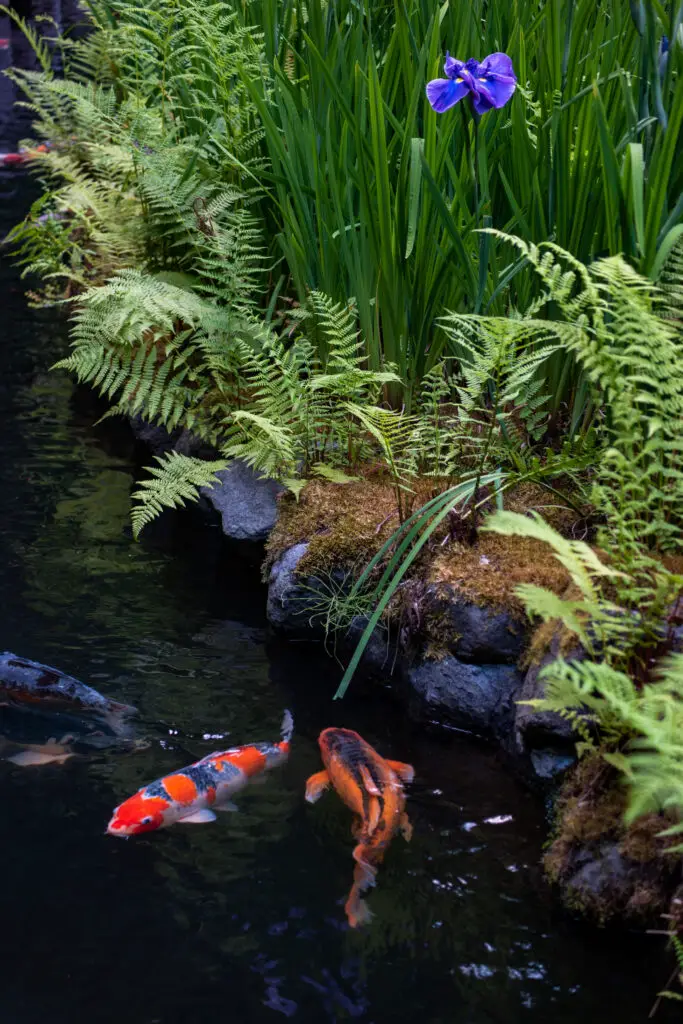
Fishpond sludge, otherwise known as fishpond sediment, muck, or silt, can be suitable for plants. This sludge is found in all fishponds. It doesn’t depend on how clean the pond is or how regular your maintenance sessions are.
Fishpond sludge is a buildup of matter at the bottom of the pond. It has many valuable nutrients that can benefit plants in your garden. However, the sludge needs to be processed before incorporating into the soil for the plants.
One of the best ways to process the fishpond sludge is composting. The sludge, grass, and wheat straw can be combined and undergo the composting process.
Although you can use the nutritional content of the compost from fishpond sediments to help plants grow, it is still lower than typical compost. The lower range of organic matter found in fishpond sludge is most likely due to the higher amount of sand, which is a mineral matter.
Another factor to consider is the contents of the individual ponds’ sludge. The fish breeding system, feed, and overall management and cleaning system of the pond can all influence the makeup of the sludge. The type of fish, such as Koi, could play a role in the makeup of the pond sediment.
Compost from fishpond sludge can be used for plants but should be supplemented with regular compost. Although fishpond sludge might not be the nicest thing to work with, it should not be wasted and is a great matter to recycle.
Can Koi Pond Water Be Bad For Plants?
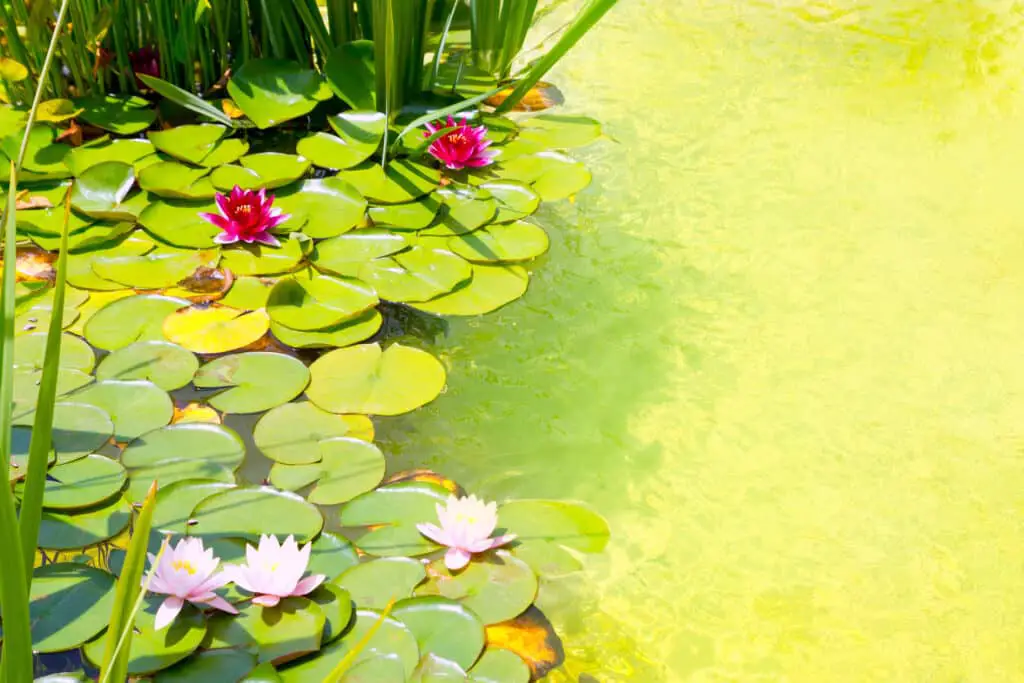

There are aspects of Koi pond water that could be harmful to plants. It is essential to know about these before you water your plants with pond water. Firstly, sometimes the pond water has too many nutrients, like an excess of nitrates.
This can occur due to improper pond maintenance, such as having too many fish in the pond or not removing the dead foliage regularly. Secondly, too many pathogenic microbes in the water could harm the plants.
These microbes refer to birds or other animal droppings that potentially carry diseases or parasites in the water. This can harm the fish and, once infiltrated into the water, the plants too.
Thirdly, runoff or wastewater collected in your pond from factories or other residential areas can contain harmful elements. The harmful contents of wastewater will most likely be quite diluted as it is caught in ponds. However, it can still be bad enough to cause damage to the plants.
Before watering your garden with Koi pond water, test the water for its nutrient content to ensure that it is at the correct levels to be good for the plants. You may have to implement methods to prevent runoff water or infrastructure from preventing animal droppings.
Factors That Influence If You Can Use Pond Water For Plants
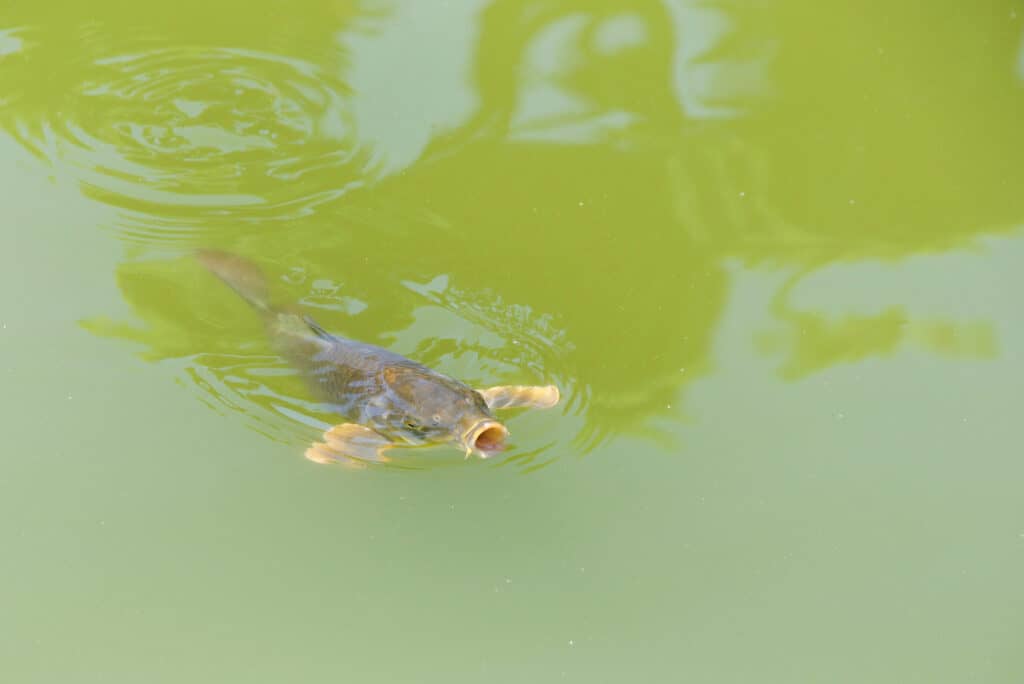
Although pond water is generally good for plants, there are various factors to consider to decide whether you should water your plants in this way. The algae in the pond water differ, and some can harm plants.
The type of algae in your pond could be essential for its ecosystem. If removed from the pond in large quantities, some plants in the pond itself could die. If you are unsure if the type of algae in your pond is necessary for its growth, one solution is to use less water from the pond for watering.
Another thing to be aware of is how much algae is in the pond water. Try only to use water without the algae to water your plants. This is particularly important for plants that you could consume. The algae can go through the roots and spread to the edible part of the plant, which could make people sick.
If you want to learn how to get rid of algae in your koi pond, I have written a blog post called: what is the best algae remover for my koi pond?
Check if any microbes could cause disease in the water. This is especially important if you want to use pond water for vegetable gardens. Even a small amount of infected water could destroy your fruits and veggies.
Certain bacteria in pond water can suffocate the roots of plants. So instead of doing the opposite – keeping your plants well hydrated – you may be contributing to them becoming dry and brittle. Therefore, it is vital to do some tests for bacterial compounds in the water.
How To Make Pond Water Safe For Plants
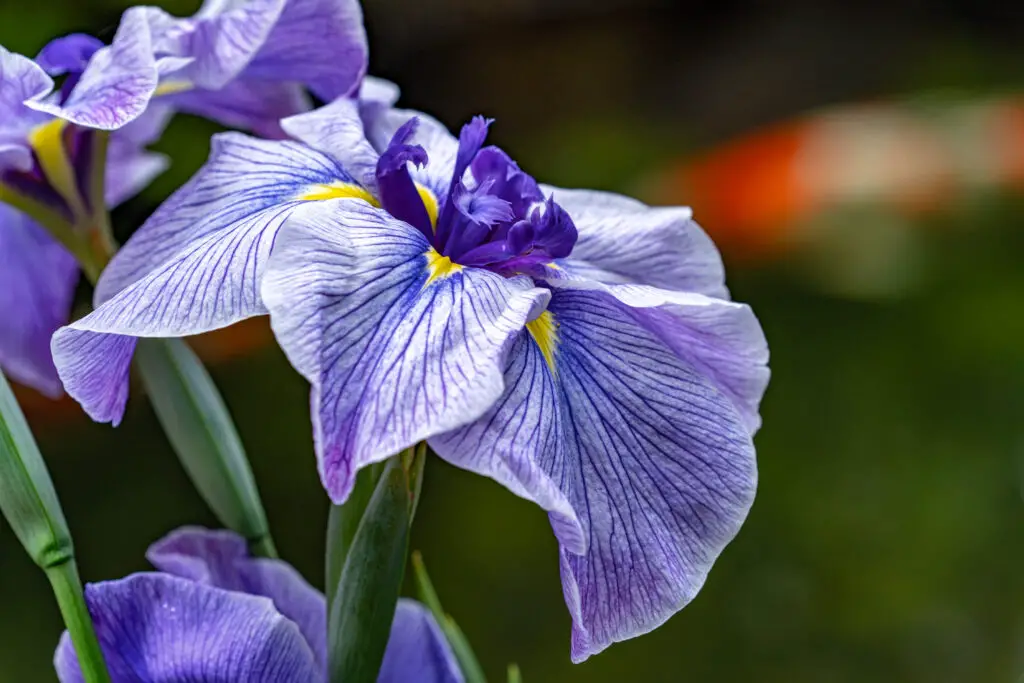
Knowing about all the different ways pond water may not be good for plants, you might consider treating the water. This process does not have to be long or filled with many chemicals. Instead, it is a much simpler process and long-term solution.
Before using Koi pond water on your plants, go through the following easy steps to make the water safe. It is really important for the well-being of your plants and fish.
Use A Residential Water Filtering System
When planning your pond, it is important to factor in a filtration system. This system is a device that removes the toxins in the water, making it safe for the soil and plants. A residential water filtration system works incredibly well for medium to large ponds.
Test A Sample of Water At A Lab
Doing a lab test is the only real way to know what the ecosystem of your pond is like. Your local lab will be able to assist you in identifying the levels of certain compounds in the pond water. Take a sample of water to them, and they can test for nitrogen levels and other compounds.
Filter The Water Before Using It On Plants
It’s best to filter the water properly before using it on plants in your garden. Some filters that have been suggested for plant use are charcoal filters. These filters are slightly different from the residential filtering system attached to your pond.
Swimming pool filters can also work, as they are designed to remove algae. These filters are made specially to extract the pollutants in the water, including toxic compounds and algae, which would be harmful if used on plants.
Use A Chlorine Removal Kit
If you add chlorine to your pond water, there are two important reasons to use a chlorine removal system. Firstly, use a de-chlorinator, so the chlorine doesn’t burn the fish.
Secondly, you should remove chlorine because it won’t be good for plants. Many fish ponds, like Koi ponds, do not use any chlorine. However, some do keep the water from getting too murky.
Why Using Pond Water For Plants Is Good For A Koi Pond
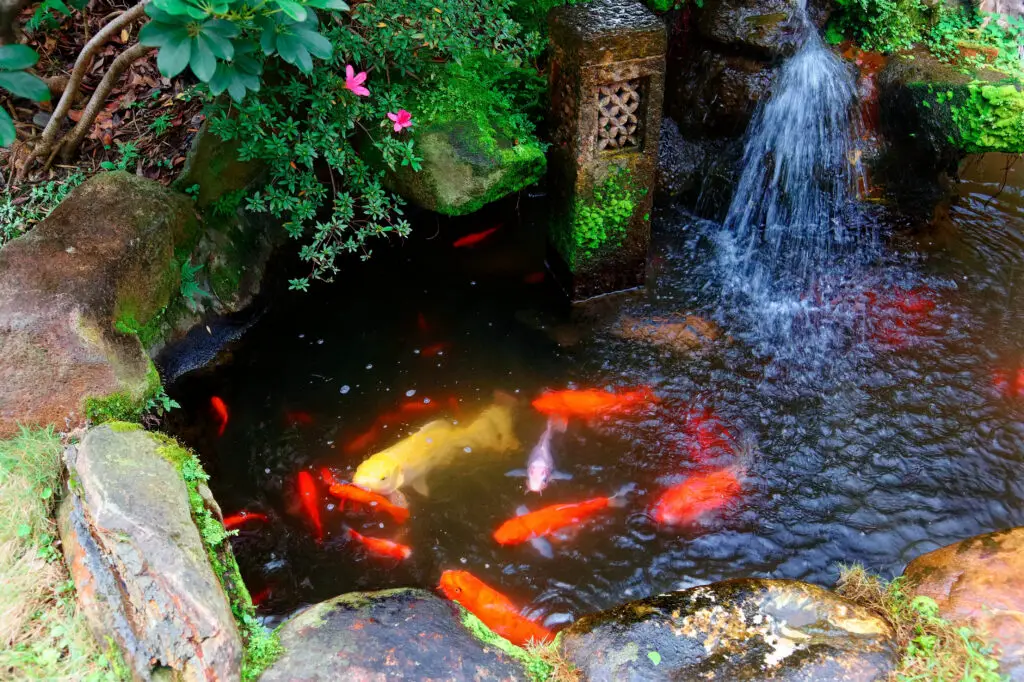
Using pond water is great for plants, but it is also good for the well-being of a Koi pond and its fish. It is a way to ensure that the pond water is being maintained correctly but including regular water changes.
It improves the pond’s water quality as pollutants are removed, which is, in turn, good for the Koi and any plants growing in the water. Regular water changes also control the algae level, keeping it healthy. Lastly, it stabilizes the pH level of the water.
Different plants can be sensitive to pH levels in the water. The acidity level is also important for the Koi and the water plants. A lab could check what pH levels suit your garden’s flowers, vegetables, and other plants.
Recycling the water is good for the environment and also saves money.
It’s important to realize that you do not have to do a complete water change every time you want to water your plants. Partial water changes are great for the water too, and this can range from taking around 10% to 50% of the water.
Conclusion
Koi pond water can be a good source of nutrients for the plants in your garden. How good pond water is for plants depends on the health of the pond water, the fish, and the cleaning maintenance schedule.
Fishpond sludge can also be beneficial for plants to grow, but first, it needs to undergo a composting process. Most importantly, the extra moisture and nutrients from the Koi pond water can help the plants grow, paired with typical compost and fertilizers.
References
https://www.quora.com/Can-you-use-fish-pond-water-for-nutrients-for-plants
https://www.youtube.com/watch?v=KLhXzSmpVL4https://www.lakemanagementinc.net/project/koi-pond-water-for-home-gardening/
